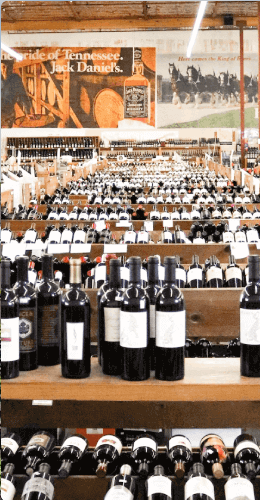Does Wine consumption really support cognitive function in middle age and older people?

Scientists have documented the potential health benefits of wine for over three decades. This is usually most prominently connected to cases of cardiovascular disease, but evidence also exists related to cognitive ability and dementia. In 2005, after studying thousands of people, two studies concluded that moderate alcohol consumption had better results for cognitive function in adults than not drinking. This included red wine and white wine, for men, but especially for women.
Of course, scientific research is all about multiple independent studies released now and then over time, often following cohorts—people leading their normal lives--over time instead of randomized controlled trials.
I thought I’d look into what scientific reports exists specifically on improving or maintaining cognitive function, including as we all get older. Should we buy wine online to enhance cognitive health? Is red wine better than white wine, as is the case for other aspects of health? What about dessert wine?
A study of 6000 people in the United Kingdom concluded that people who drank at least once a week compared to those didn’t had a significantly higher level of cognitive function in middle age. “This protective effect on cognition was seen in people who drank up to 30 drinks per week,” reported the New York Times in 2015. Indeed, even US government guidelines have recommended up to five ounces of wine helped maintain cognitive function intact as people age. These cohort studies and government guidelines about wine, too, are all about moderation, which is linked to socioeconomic status. The fact is moderate drinkers tend to be relatively well off with a higher education level, which in turn results in overall better health care, more regular exercise, less obesity, and healthier diets. So, maybe it’s a coin toss.
In general, wine is healthy because of compounds coming from grapes, in particular polyphenols and anti-oxidants found in grape skins and stems. This includes cognitive health related to Alzheimer’s. A 2019 study into flavonoids, which included those in red wine, on neurodegenerative diseases concluded that the proteins that can cause Alzheimer’s are inhibited by drinking. In general, dessert wine has more calories, and I found no reports that they, as opposed to red wines, have particular health effects, but there’s also a lack of studies on dessert wines in particular. One study that included dessert wines found they have high levels of catechins, one of the most common of polyphenols. Catechin is a member of the flavonoids family, a naturally occurring phenol, an antioxidant, and a secondary metabolite in grapes (and tea). Another study concurred that dessert wine, among other types, has a high level of monomeric phenolic compounds, which means “antioxidant activity.” This study broke down wines by type, which is an intriguing twist in the current research.
Red wine, by far, leads the pack of wine styles in terms of potential health benefits, including in battling dementia and enhancing cognitive health. But what kind of red wine should you chose in this regard when you buy wine online?
I found one medical practitioner who honed in on the different kinds of red wines. He’s a naturopath and clinical nutritionist with a post-doctorate certification from Harvard Medical School, who also boasts board certification in alternative and integrative medicine. And he likes wine for its health benefits (though he’s not a researcher).
His top pick? Pinot Noir wine, which he names as the red wine with the greatest number of health benefits, noting that it has lower sugar levels and thus lower calories than other red wines. Specifically related to cognition, Pinot Noir wine enhances brain health, he says, linking to a report on a Yale University neuroscientist concluded how “tasting wine engages more of the brain than any other human behavior.” Tasting and smelling wine involves multiple bodily functions, which in turn engages brain activity. Pinot Noir is top pick, too, because it has high resveratrol that may diminish the negative effects of dementia, including from Alzheimer’s, and “other degenerative neurological illnesses.”
Second on his list? Malbec, the flagship wine of Argentina, but also a California wine. This, in turn, relates to the Malbec grape’s thick skins (whereas, notably, Pinot Noir is thin-skinned). Malbec wines have relatively higher levels of resveratrol, quercetin, and other antioxidants like polyphenols, with four times the antioxidant content of Merlot wines and almost twice as much as Cabernet Sauvignon wines. Inflammation in bodily systems, including in the brain, is bad for overall health. Merlot’s high polyphenols help reduce inflammation when drunk in moderation, which helps lower chronic disease risks.
To conclude, just this year a research article on the “Association Between Wine Consumption and Cognitive Decline in Older People,” which conducted a systematic literature review of long-term studies. This review included studies from nine countries found in different medical research databases and included publications up to May, 2021. What did they report? There exists evidence of “a protective effect of wine consumption against cognitive decline.”
Did you enjoy reading more about wine and its health effects, particularly cognitive ability? Check out our other wine articles from your favorite California wine store!
By Charlie Leary


















Leave a comment